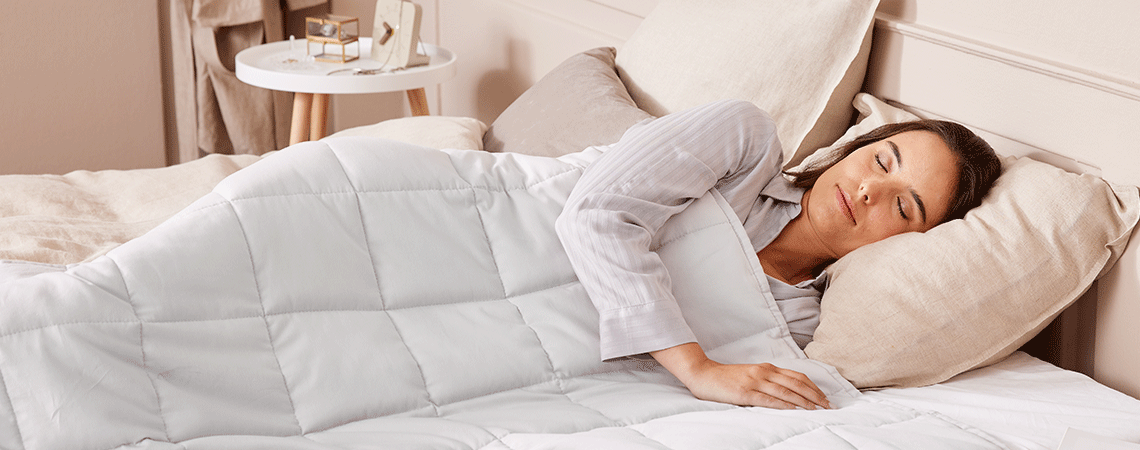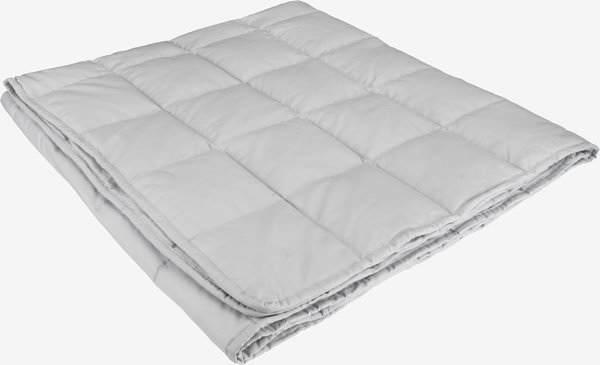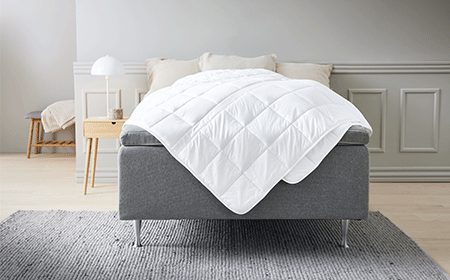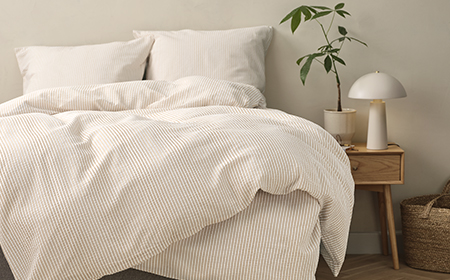Do you often find yourself lying in bed, tossing and turning, struggling to relax and fall asleep at night? A weighted duvet could be the solution to your problem. These specially designed duvets offer a range of benefits, including improved sleep quality and enhanced relaxation.
In this blog post, we’ll take a closer look at what a weighted duvet does, what to consider before buying one, and how it can help make your nights calmer and more restful. You’ll also get answers to questions such as:
- What is a weighted duvet?
- What are the benefits of a weighted duvet?
- What should you be aware of when buying a weighted duvet?
- Why does a weighted duvet have a calming effect?
- How much does a weighted duvet cost?
What is a weighted duvet?
You might be wondering, what does a weighted duvet do? Simply put, it’s a specially constructed duvet that’s significantly heavier than standard fibre or natural-fill duvets, designed to create a calming, pressure-based effect that feels similar to a gentle hug.
While most regular duvets weigh under 1.3 kg, weighted duvets typically range from 7 to 9 kg. The weight comes from a unique filling – often small glass beads that make up around 95% of the duvet’s contents. These beads help the duvet mould to your body and apply an even, light pressure that promotes comfort and calm.
At JYSK, our weighted duvets are available in:
- 7 kg
- 9 kg
As soon as you try one, you’ll notice how snugly it wraps around your body – providing a secure, soothing experience unlike anything a standard duvet can offer.
What are the benefits of a weighted duvet?
There are several reasons why people are turning to weighted duvets to improve their sleep. Some of the key benefits include:
- Improved sleep quality: The gentle pressure may help reduce nighttime restlessness and help you fall asleep faster.
- Enhanced relaxation: Weighted duvets are often described as comforting, helping to reduce feelings of stress and tension.
- Possible support for mental wellness: Some users report that the “hug effect” helps with anxiety, meaning the weighted duvet may also offer a sense of safety and calm.
Whether you're struggling to wind down in the evening or simply want to upgrade your sleep environment, a weighted duvet may be a valuable addition to your setup.
What should you be aware of when you buy a weighted duvet?
It’s important to choose a weighted duvet that matches your body weight – especially one that isn’t too heavy. As a general rule of thumb, the duvet should weigh around 10-15% of your body weight. For example, if you weigh 70 kg, both a 7 kg and 9 kg duvet can be suitable. But if you weigh 50 kg, the 9 kg version would likely be too heavy, as it exceeds the upper 15% recommendation.
Finding the right balance is key. The weighted duvet should feel like a light, gentle pressure across your body – not too light that it has no effect, and not so heavy that it restricts movement or comfort.
Recommendations for weight
Your weight | Weighted duvet weight |
50-60 kg | 5-7 kg |
60-70 kg | 7-9 kg |
70-80 kg | 7-11 kg |
80-90 kg | 9-11 kg |
90+ kg | 9-13 kg |
See our selection of weighted duvets.
Why does a weighted duvet have a calming effect?
The calming effect comes from something known as deep touch pressure. A weighted duvet gently presses against the body in a way that’s often compared to a soft hug. This tactile sensation can help calm the nervous system and encourage your body to relax – similar to the effects of a massage or even acupuncture.
For people who feel restless or anxious at bedtime, this effect can make it easier to fall asleep and stay asleep.
How do you get started with using a weighted duvet?
Getting started is simple – just cover it with a duvet cover and use it as you would a regular duvet. However, due to its flatter design and greater density, it might feel quite different from what you’re used to. Here are a few tips for easing into the change:
- Layer your regular duvet on top during the first few nights for a familiar, snug feeling
- Start by using the weighted duvet only over your legs, then gradually cover your full body
- Give it up to 14 days to get used to the feel
Once your body adjusts, you’ll be able to enjoy the full calming benefits and may notice an improvement in sleep quality.
Are weighted duvets warmer than normal duvets?
Weighted duvets retain heat slightly better due to the density of the glass bead filling, but they’re not dramatically warmer. Many people use them year-round, including during summer. That said, if you’re prone to overheating at night, it’s a good idea to keep a lightweight summer duvet on hand as an alternative.
How much does a weighted duvet cost?
Due to their specialised materials and construction, weighted duvets are often priced a bit higher than standard duvets. However, at JYSK, you’ll find them at competitive prices similar to many fibre and natural duvets. To learn more about the cost of duvets in general, check out our blog post: How much does a duvet cost?
At JYSK, you'll find only single weighted duvets, as the snug “hug effect” is most effective when tailored to one person at a time.
A weighted duvet isn’t just a trend – it’s a well-loved choice for those seeking deeper rest and more relaxed nights. Whether you’re curious about the science behind it or simply want to experience the comfort yourself, our range at JYSK offers a great place to start.
To learn more about duvets, check out our ultimate guide: Which duvet should you choose? If you’re particularly interested in knowing more about duvet sizes, check out our guide to choosing the right duvet size.






